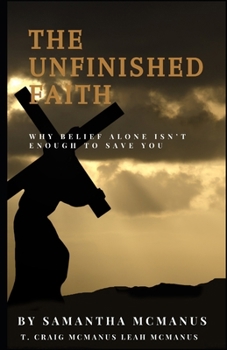The Unfinished Faith: Why Belief Alone Isn't Enough To Save You
We often mistake belief for faith, and in doing so, we limit our spiritual journey to the confines of intellectual assent.
The world, for many, has come to understand faith as a passive reception of dogma, a set of doctrines to be accepted rather than principles to be lived. This book challenges that very notion, proposing that true spiritual fulfillment lies not in what we believe, but in how we actively engage with the divine principles that govern our existence. We are all, by our very nature, seekers of meaning and purpose. This innate human drive, however, often finds itself stifled by a spiritual landscape that prioritizes the recitation of creeds over the demonstration of divine love and compassion. The chasm between intellectual understanding and lived experience is vast- and it is across this chasm that our true spiritual potential lies waiting to be awakened. This exploration will focus on bridging that gap, establishing a foundational understanding of "faith in action" as a potent, transformative force capable of reshaping not only our inner lives, but also the world around us. We will move beyond abstract theological discussions to explore the practical, tangible impact of a faith that is lived, breathed, and actively expressed in the arena of everyday life. ___________ Sneak Peek into Chapter 1: The prevailing misconception of faith often reduces it to a private, internal affair, a matter of personal conviction that need not necessarily manifest in outward actions. This is akin to possessing a map but never embarking on the journey it delineates. While intellectual assent is a necessary precursor, it is merely the first step on a path that demands our full participation. Many find themselves wrestling with a sense of spiritual disquiet, a feeling that their faith, while intellectually sound, lacks a vital animating force. This yearning for a more profound connection, for a tangible experience of the divine, is not a sign of wavering belief, but rather an indication that the soul is ready to move beyond mere acceptance and into active participation. The spiritual landscape, in its contemporary form, often leans heavily towards the preservation of tradition and the articulation of doctrine. While these have their place, they can inadvertently overshadow the dynamic, transformative power that lies in the practical application of spiritual truths. We are called not just to believe in something, but to believe from something, to allow our faith to be the wellspring of our actions, shaping our interactions, our decisions, and our very being.Format:Paperback
Language:English
ISBN:B0FSLK97BY
ISBN13:9798267033541
Release Date:September 2025
Publisher:Independently Published
Length:522 Pages
Weight:1.32 lbs.
Dimensions:1.2" x 5.5" x 8.5"
Customer Reviews
0 rating





